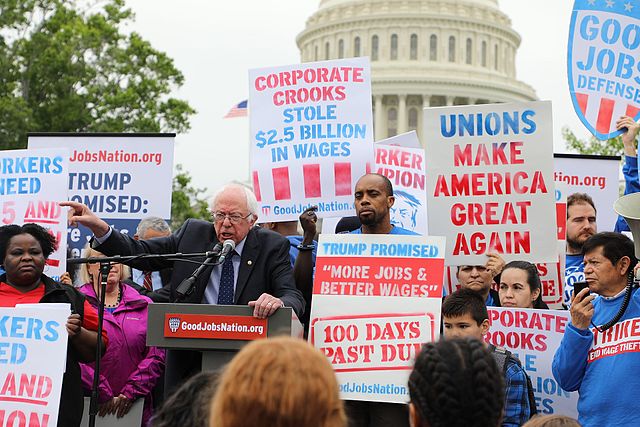Since Bernie Sanders announced his candidacy for president in the 2020 election, he has brought a seemingly disastrous and looming problem to the attention of the American people, much like he did in his 2016 run: income inequality accompanied by the tyrannical rule of the elite 1%. Why did someone who seems to be so radical have such a big influence on the Democratic primary in 2016, and have such support in this new race? It’s because he took something that everybody can see—large disparities of wealth—and he decried it as an injustice to the poor. He convinced many people that income inequality and corporate elitism are the disease that has been plaguing our society, and made himself to be a political Robin Hood, who would take from the rich and give to the poor. To use Marxist terms, he described the problem to be the exploitation of the proletariat by the capitalist bourgeoisie. Income inequality, however, is simply a byproduct of society’s already existing just and unjust realities
It would be naive to think that all of the income inequality that exists in society is due to natural market forces. It’s easily seen that there are injustices in our free market that create some level of income inequality. A few examples are cronyism, racism, exploitation, subsidies, sexism, bailouts, and burdensome regulations. We should agree that these injustices are wrong, and not only hurt the poor, but also the rich in the long run.
Inequalities like racism undermine the dignity of people. As a Reformed Christian, I am led to believe in the concept of Imago Dei, which means that all people are made in the image of God. This doesn’t mean that everybody is the same, we are all unique, but we are all equally valuable in the eyes of God. Injustices like the examples listed above all undermine human dignity, which is founded on the moral principle of Imago Dei. If you believe everyone is made in God’s likeness, it becomes impossible to morally justify oppressing anybody. Besides, it’s just smart business to acknowledge human dignity in this way.
Let’s use racism as an example. From the perspective of a rational hiring manager the only relevant factor should be who would be the best worker and contribute the most to the business. It’s irrational to avoid hiring someone who is more skilled than other job candidates simply because they are a different race. This is evidenced strongly through the desegregation of baseball. Once Jackie Robinson joined the Dodgers in the Major Leagues, other teams started integrating black players.
In fact, there is strong evidence that the teams that desegregated sooner had higher win rates. Additionally, while the league was made up of only 20% black players, over 40% of the “star players” were black for many years, proving that ending the discriminatory practice would only improve competition, increase performance, and reduce the inequality in the Major League industry. This helped both the black baseball players, but also the owners of the teams, the poor, and the rich.
Racism is just one example of an unjust market force that can cause inequality. The question shouldn’t be whether these forces do or do not cause income inequality, it’s the extent to which they cause them and what we can do to fix them. That being said, not all income inequality is attributable to injustice. As was stated earlier, there are natural market forces that cause income inequality.
Natural ability, hard work, innovation, and tenure are all examples of natural sources of inequality. Each person has a unique set of skills and traits that make them an individual. These skills vary greatly and to varying degrees. It’s simply a reality that certain people are born extremely intelligent, creative, and talented, and others are born with less of those gifts. Capitalism naturally puts value on the product of a person’s labor, so the person who is able to work harder for longer will be more valuable than a person who can’t or won’t.
Another helpful way to think about fair inequality is through the lens of innovation. Should a person who has a great idea for a helpful product be rewarded for such an innovation? Of course. Most people would agree that people who make helpful products should be rewarded.
Even Bernie Sanders has made over $1.7 million from the books he has written. Despite his anti-wealth sentiments, I applaud him for his engagement in the market, but will also point out the irony. He said in an interview with the New York Times, “I wrote a best-selling book. If you write a best-selling book, you can be a millionaire, too.” For someone who is a strong critic of capitalism, he acknowledges that work deserves reward, and good ideas should be richly rewarded. Bernie has, possibly unintentionally, admitted that he believes that income inequality is fair in this quote.
He is using an if-then statement, which implies cause and effect. “If you write a best-selling book, [then] you can be a millionaire, too.” The converse, therefore, is also true. If you don’t write a best-selling book, then you can’t be a millionaire. Strange. His advice to people who want to attain wealth is to innovate, have good ideas, and engage in the free market like he did.
To add icing to the cake, Bernie recently reduced the number of hours his staff is allowed to work so that their salary will be equivalent to $15 an hour. This tragic irony further proves that Bernie Sanders doesn’t even believe what he says. When forced to pay $15 an hour to his staff (his own self-imposed restriction) the only thing that he could do to meet that standard was restrict the amount his staff is allowed to work so that he could afford to pay them. Regulations like these don’t solve inequality, they promote inequality. Establishing a high minimum wage not only addresses symptoms instead of root problems, it also causes a loss of jobs, increases inflation, and restricts the ability for businesses to start up and grow (the poor’s most effective method of rapid wealth increase).
Even if he doesn’t say it outright, Bernie Sanders acknowledges that some types of income inequality are acceptable. While failing to distinguish between acceptable inequalities like innovation and hard work from unjust inequalities, his point that inequality is our great societal woe is overstated. Because it’s inherently a symptom of deeper just and unjust forces, a solution that only deals with minimizing income inequality, like taxes, is like giving a blood transfusion to someone who is bleeding out from a lost arm. Despite addressing the symptom of losing blood, the bleeding won’t ultimately stop until the wound is cauterized and bandaged, much in the same way that unjust income inequality won’t be truly solved until the underlying problems are solved. Establishing a $15 minimum wage won’t solve income inequality, it will merely strain the economy as Bernie is discovering first hand. However, fixing the underlying injustices will not only make things more equal, but will make everyone better off.
Maybe it’s time for us to bring about Bernie’s capitalist vision of society where people who write popular books, like him, do get rewarded and people don’t get rich by putting others down. If, in the process, income inequality goes down while everyone gets richer, then that’s great, everybody is better off. Isn’t that, at the end of the day, what capitalism is all about?
Featured Image: U.S. Congress Public Domain

